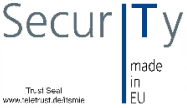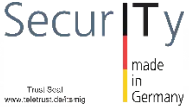Robert Gebhardt serves as the Partner Channel Director for EMEA at Infosequre (BeOne Development). With over two decades of expertise in sales and partner management within the global IT and cybersecurity sector, he is dedicated to enabling business partners to enhance their clients’ security awareness.

You joined with infosequre our Bosch CyberCompare Provider Directory. Could you introduce Infosequre to our readers?
Certainly! Infosequre is part of the BeOne Development Group, a group of companies dedicated to improving learning experiences in organizations. We work hard to create digital learning solutions, from making engaging content to implementing learning programs and collaborating with customers and partners. We started in 1999, specializing in top-notch Security Awareness Training (SAT) modules, tests, videos, and other learning materials. We have over 60 modules in various languages, covering all the important topics. What makes us unique is that our content is Europe-centered, unlike our competitors who are mostly based overseas. Our materials are culturally sensitive, which helps learners connect better and improves their learning results.
What kind of security solutions do you provide?
Our SaaS platform contains a Security Awareness Library covering 30+ risk topics. The training modules come in different lengths and formats, designed for specific learning goals. We focus on making our content engaging by using gamification and storytelling. In our library, we have Introduction Programs that give a quick overview of essential security topics, taking only 20-30 minutes to complete. They’re great for starting awareness campaigns. For more in-depth learning, we offer e-learning modules that dive deeper into day-to-day tasks. These 10-15 minute modules include videos, interactive elements, tests, and conclusions. They can be customized for specific groups. To reinforce knowledge, we provide Microlearnings and Security Flashes for quick refreshers in 1 to 5 minutes. Our Baseline tests give a snapshot of employees’ knowledge and find knowledge gaps. Lastly, we have a user-friendly Phishing Simulation Tool that lets clients test their employees’ resistance to phishing attacks. It comes with 30 customizable phishing email templates and landing pages, making campaign setup quick.
Security Awareness stays one of the hottest topics in cybersecurity.What is the specific approach of Infosequre?
Creating lasting change in employee behavior through a single action is tough. People tend to forget new info, as shown by Ebbinghaus’ “Forge[ng Curve.” To maintain risk-aware behavior, continuous training is crucial. Building a strong security culture requires an ongoing process: awareness, training, activation, refreshment, measurement, evaluation,and repetition. Infosequre’s security awareness program is designed to guide your employees effectively. We offer regular, brief interventions post-introduction, along with deeper training, micro-learning, awareness videos, and practical tests. These tools keep employees alert to security risks. By consistently reinforcing the desired behavior, you can nurture a robust security culture.
Companies are afraid to spend money on nice training and eLearning solutions but ending up with low impact. What is the key to keep associates really engaged?
Our programs are great at getting employees involved. We create interesting content based on important principles: positivity, interesting stories, relatable situations, usefulness, and focus. Using interactive stories and games, we teach how to spot and reduce risks. Short reminders help keep knowledge fresh. Our training works for different industries and can be easily used on a computer, laptop, or tablet. We keep up with the latest technology to stay relevant. With our knowledge of the European market, we customize programs to fit cultural practices, providing effective, personalized security training.
Do you recommend to include phishing campaigns in the training concept or tun security awareness without?
Yes, I strongly recommend incorporating phishing simulations into your training program. They’re essential for enhancing cybersecurity awareness. These simulations help employees recognize and respond to real phishing attacks effectively. This awareness reduces the risk of data breaches and promotes a culture of cybersecurity. It builds trust with clients and partners, safeguarding sensitive data and bolstering your company’s reputation. In today’s digital world, it’s not just about finances; it’s about trust and confidence.
What is your outlook to the market? Will it also be influenced by trends like AI and how?
I see the cybersecurity awareness market changing quickly. As cyber threats get more advanced, we all understand the importance of strong security training. AI is a big help here. It studies how each person behaves, spots weak points, and tailors training for them. This way, employees get the right guidance and learn better. AI also helps create realistic tests for spotting phishing attacks. These are great for teaching employees to recognize and react to threats. AI even spots threats in real time and tells users right away. So, to sum it up, AI makes cybersecurity training more effective. It’s not just about giving knowledge; it’s about adapting to each person’s needs and keeping up with new threats. I believe this will be a big part of the future of security awareness.
Your origin are the Netherlands. Can you share some insights about the cybersecurity market in Netherlands? Would you say in average you see a different maturity level when you look at typical customer companies?
Certainly! I’m based in the Netherlands, and here, the cybersecurity industry is steadily expanding. Dutch businesses, on average, understand the importance of safeguarding their data and systems against cyber threats. However, readiness levels can differ. Larger companies, especially in finance and healthcare, tend to have more advanced cybersecurity measures due to the sensitive nature of their data. Smaller businesses are catching up, recognizing the necessity of cybersecurity. The demand for security training and education is also rising, with more companies investing in educating their employees about cyber risks.
If you could send an email to all CISOs to address a security concern – what would you chose?
A CISO’s top cybersecurity challenge is the human factor. People are both the strongest and weakest link in security. As a CISO, prioritize security awareness. Start by creating a culture of awareness through engaging training. Use real-world scenarios, not just rules. Tailor content, host interactive sessions, and update regularly to match evolving threats. Encourage reporting and open communication. Your goals: reduce incidents, prevent breaches, and build a resilient security culture. When your team understands the ‘why’ of security, they’re your best defense. On a person level, it brings peace of mind, disaster prevention, and colleague trust. Plus, the satisfaction of guarding both data and people.
Thank you for the interview!






